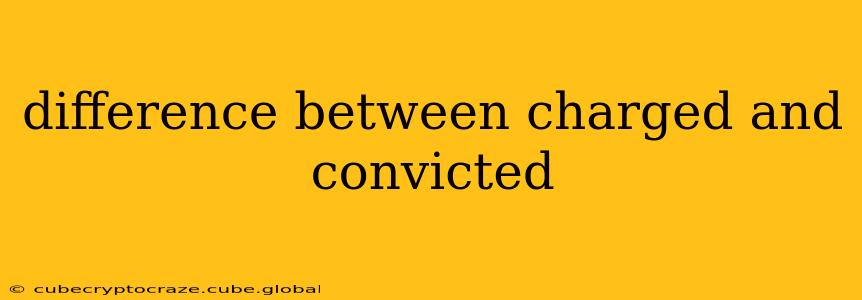The terms "charged" and "convicted" are often used interchangeably in casual conversation, but in the legal world, they represent distinct stages in the criminal justice process. Understanding the difference is crucial for anyone wanting to comprehend how the legal system works. This article will clarify the distinction, explore related questions, and provide a clear understanding of these critical legal terms.
What Does it Mean to be Charged with a Crime?
Being charged with a crime signifies the formal accusation by law enforcement or a prosecuting authority that an individual has committed a specific offense. This initiates the legal proceedings. The charge is typically documented in a formal document, such as an indictment or a complaint, which outlines the alleged crime and the relevant statutes. Crucially, being charged is not a determination of guilt; it's simply the beginning of the legal process. The accused is presumed innocent until proven guilty.
What Does it Mean to be Convicted of a Crime?
A conviction represents a final legal determination of guilt. This occurs after a trial (or a guilty plea) where the court finds sufficient evidence to prove beyond a reasonable doubt that the accused committed the crime. A conviction carries significant consequences, including potential imprisonment, fines, probation, and a criminal record. Conviction signifies the end of the prosecution phase and the beginning of the sentencing phase.
What is the Difference Between Being Charged and Being Convicted?
The fundamental difference lies in the level of certainty regarding guilt. A charge is an accusation; a conviction is a judgment. Here's a simple analogy: being charged is like being accused of breaking a window; being convicted is like being found guilty of breaking the window after a thorough investigation and trial.
Key Differences Summarized:
| Feature | Charged | Convicted |
|---|---|---|
| Status | Accused, presumed innocent | Legally found guilty |
| Legal Stage | Beginning of legal proceedings | End of prosecution, start of sentencing |
| Evidence | Sufficient evidence for accusation | Sufficient evidence beyond reasonable doubt |
| Outcome | Trial or plea bargain may follow | Sentencing and potential punishment follow |
What Happens After Someone is Charged with a Crime?
After being charged, several things can happen:
- Arraignment: The accused is formally informed of the charges and enters a plea (guilty, not guilty, or no contest).
- Pre-trial proceedings: This involves evidence gathering, motions, and plea bargaining negotiations.
- Trial: If a plea bargain isn't reached, a trial takes place where evidence is presented and a verdict is decided.
Can Someone be Charged but Not Convicted?
Absolutely. Many cases end with the charges being dropped or the accused being acquitted (found not guilty) at trial. This highlights the importance of the presumption of innocence and the need for sufficient evidence to secure a conviction. Even if a case goes to trial, the prosecution might not be able to prove guilt beyond a reasonable doubt.
What are the Consequences of a Criminal Conviction?
The consequences of a criminal conviction can be severe and long-lasting, varying depending on the severity of the crime. These can include:
- Imprisonment: Time spent in jail or prison.
- Fines: Monetary penalties.
- Probation: Supervised release into the community.
- Community service: Unpaid work for the community.
- Criminal record: A permanent record that can impact employment, housing, and other aspects of life.
How Long Does it Take to Go from Being Charged to Being Convicted?
The time it takes to go from being charged to being convicted varies greatly depending on the complexity of the case, the jurisdiction, and the availability of court resources. Some cases resolve quickly through plea bargains, while others can take years to proceed through the entire legal process.
Understanding the critical difference between being charged and convicted is essential to grasping the complexities of the legal system. While a charge marks the start of legal proceedings, a conviction signifies a final judgment of guilt with potentially life-altering consequences.
